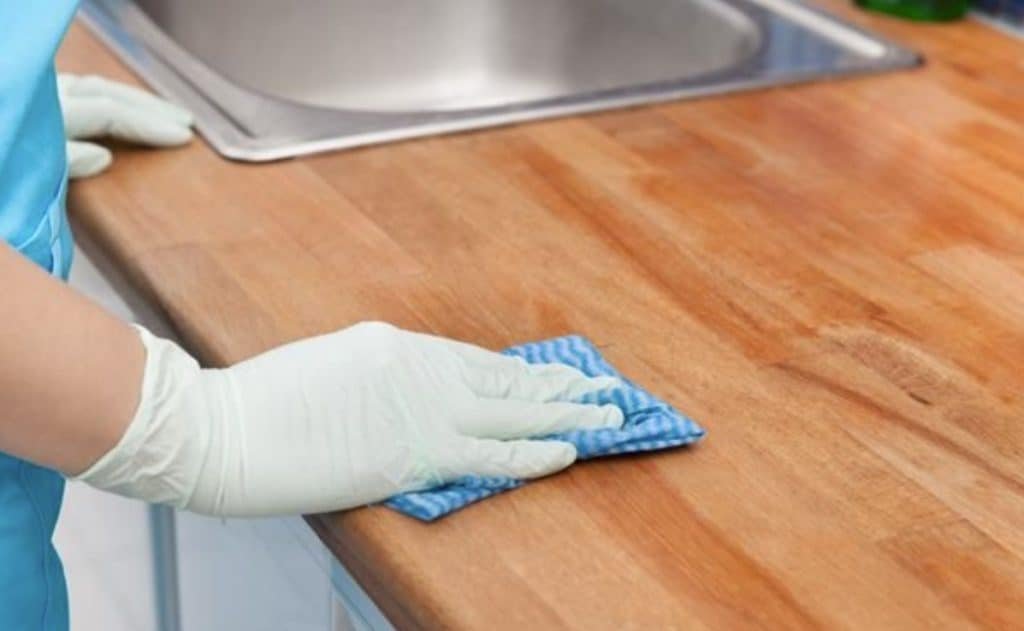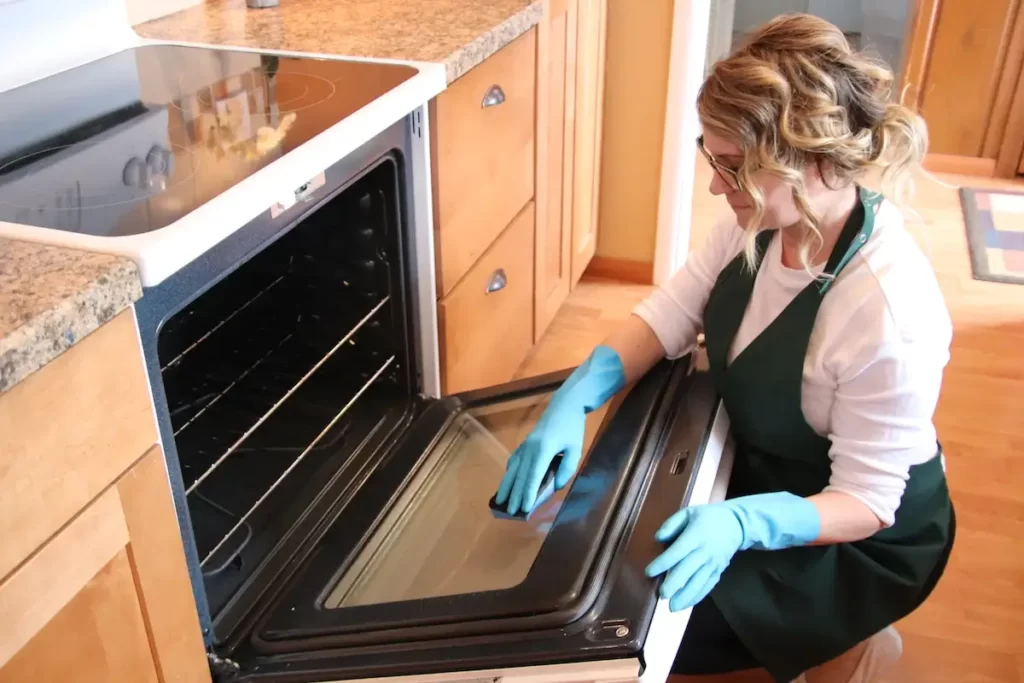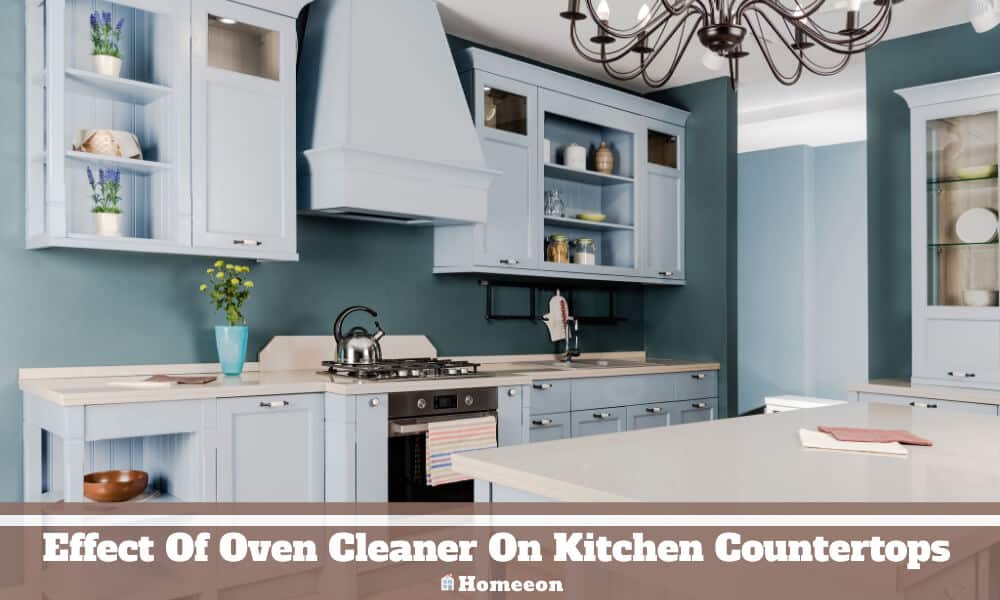Last Updated on August 10, 2023 By Emma W. Thomas
Oven cleaners, usually containing strong chemicals like lye or ammonia, can harm kitchen countertops. They may cause discoloration, etching, or surface damage. Granite and marble are particularly vulnerable. Promptly wipe any spills and avoid using oven cleaner on countertops.
Effect Of Oven Cleaners On Different Countertop Materials

As we’ve already mentioned, oven cleaners react differently on different surfaces, depending on their material. In this section, we look at the effect of oven cleaners on different countertop materials.
Wooden Countertops
Wooden countertops have a clear varnish or a coating that protects the wood from moisture, causing rotting. Oven cleaners have harsh chemicals that strip this coating when used on countertops. When you spray or apply an oven cleaner on a wooden surface, you’ll notice the varnish becoming sticky as its being stripped off. When an oven cleaner penetrates the wood, it hardens it and sometimes causes bumps that are hard to repair. If you want to remove grease from a wooden countertop, use water and a dishwashing detergent instead of an oven cleaner.
Tips On How To Clean A Wooden Countertop
- If stained, sprinkle lemon juice on the stain and scrub with a cleaning sponge to remove the stain.
- Sand your countertops regularly and apply food-safe mineral oil after sanding. Doing this will get rid of any tough stains and keep your countertops refreshed. When sanding, a 120- grit sandpaper is recommended
- Use a waterproof mat when handling messy tasks to keep your countertops mess-free. Ensure you clean up these countertops after every use.
- For a gentle clean, use a wood surface cleaner with neutral pH and microfiber dusters on your wooden countertops.
Tiled Countertops
Tiles are stronger and more enduring compared to wood, but oven cleaners also affect them significantly. Oven cleaners react with the grout in between the tiles and eat away the glossy finish on the tiles. Not only will your countertops look ugly, but their functionality will also be affected. Corroded tiles harbor harmful microorganisms and bacteria, which can easily be transferred to your food. The damage caused by oven cleaners on tiled countertops is irreversible. To remove grease on tiles, use warm water and a gentle detergent.
Tips For Cleaning Tile Countertops
Ceramic tile kitchen countertops are prevalent in most homes, and cleaning them will leave your kitchen looking neat and free from bacteria.
1. Use a commercial tile cleaner for day-to-day cleaning or mix a cup of water with an equal amount of vinegar to remove germs
2. Use a soft brush and a mild bleach solution to clean the grout and remove any particles on the grout
3. Seal the grout using a grout sealer to prevent stains or discoloration and damage on the grout
Marble And Granite Countertops
Countertops made from natural stone such as granite or marble look elegant and are easy to clean and maintain. Granite and marble can withstand the harsh chemicals present in an oven cleaner, but they may lose their sheen. Using an oven cleaner on these countertops leaves them spotted and dull-looking; it’s not recommended.
Tips For Cleaning Marble And Granite Countertops
- Avoid any acidic cleaners such as bleach or vinegar on these surfaces since they cause dullness
- Use a soft sponge or cloth instead of an abrasive sponge
- Wipe up spills immediately to keep them from penetrating the countertop surface and avoid stains
- Use mild detergent and warm water to clean these countertops and remove any oil stains. If you notice a stain on your countertop, use baking soda to treat the stain and remove it.
Laminate Countertops
Laminate countertops are more enduring to an oven cleaner’s effects, with the only risk being possible discoloration. Spraying an oven cleaner on your laminate countertop then wiping it down immediately cannot cause damage. If you wish to remove grease or oil on your laminate countertops, use water and some mild detergent.
Should You Use Oven Cleaner on Kitchen Countertops?
In an attempt to achieve spotless and gleaming surfaces, using an oven cleaner on kitchen countertops might be tempting. Here’s a comprehensive look at the pros and cons of such a decision.
1. Easy to Use
Oven cleaners are widely acclaimed for their convenient user interface. They usually come in an easily applicability form, such as a spray, allowing homeowners to efficiently clean their surfaces.
2. Powerful Ingredient Composition
The high chemical concentration in oven cleaners is undeniably effective in removing grease, grime, and residual food particles. Their potent formulation makes them a powerful cleaning agent.
Contrarily, reasons not to use oven cleaners on countertops include:
1. Potential for Surface Damage
Oven cleaners can potentially damage the surface of countertops, especially those made of sensitive materials like marble or granite. The harsh chemicals can discolor or dull the finish, leading to a detrimental aesthetic impact. It’s advised to always check the material’s suitability before application.
| Countertop Material | Potential for Damage |
|---|---|
| Marble | High |
| Granite | High |
| Laminate | Medium |
| Stainless Steel | Low |
2. Health Concerns
The robust chemicals in oven cleaners can pose health risks. Breathing in the fumes can affect respiratory health and cause skin and eye irritation upon contact. Thus, it’s necessary to exercise caution while using such aggressive cleaning products.
3. Negative Environmental Impact
Oven cleaners are often composed of harsh chemicals that are harmful to the environment. When washed off, they can contaminate water bodies and soil, causing long-term environmental damage.
4. Unnecessary Cost
While oven cleaners can handle stubborn stains, there are less expensive, safer alternatives available. Items from your pantry like vinegar, baking soda, or mild dish soap can also effectively clean kitchen countertops without the associated disadvantages.
While oven cleaners are effective, considering their potential to damage countertop surfaces, their health risks, environmental impact, and cost, they may not be the most optimal choice for kitchen countertop cleaning. It’s imperative to explore safer and eco-friendly alternatives to maintain the longevity and aesthetic of your kitchen countertops.
An Alternative Method For Cleaning Your Kitchen Countertop
Ditch that oven cleaner for a natural cleaner on your kitchen countertops to cut costs and protect your surfaces from harsh chemicals. Let’s see how you can use simple kitchen ingredients to make an efficient and natural cleaner.
What You’ll Need:
- 1 cup of water
- ¾ cups white vinegar
- Spray bottle
Method
- Mix vinegar and water and put into the spray bottle
- You can add a few drops of dishwashing liquid to restore sheen on your surface and extra cleaning
- Spray this solution gently on your countertop and wipe it off with a microfiber cloth. This solution can be used as an everyday cleaner on your kitchen countertops
To Remove Grease On Countertops, You’ll Need:
- Water
- Baking soda
Method:
- In a bowl, mix water and baking soda to make a thick paste.
- Apply the paste on the oil or grease stains and cover with plastic wrap then leave overnight
- Rinse off in the morning to get rid of the stain
- This mixture can also remove ketchup and coffee

Conclusion
Oven cleaners are made with strong chemicals to remove stubborn stains and oil splatters in your oven. When applied to kitchen countertops, these chemicals can cause irreversible damage, and it’s not recommended. When using an oven cleaner, ensure you have gloves on to prevent skin irritation. We recommend using a mild countertop cleaner or making yours using the method we’ve shown for kitchen countertops. Making your cleaner guarantees your safety since you know what went into the cleaner and cut costs using readily available and affordable ingredients. We hope that this information has helped you understand why your oven cleaner should be left for oven cleaning only.
References:
https://kowalskigraniteandquartz.com/whats-the-effect-of-oven-cleaner-on-kitchen-countertops/
https://www.caesarstoneus.com/blog/what-is-the-effect-of-oven-cleaner-on-kitchen-countertops/
Emma is a graduate of Domestic Science or Family and Consumer Sciences (Home Economics) from the University of Wisconsin. She has 7 years of experience Working with the strategic section of BestBuy and now writing full-time for Homeeon.
From Managing the Home, Interiors, Cleaning, and Exteriors to Gardening and everything about Making A Home Liveable – is her passion and this Homeeon is the result of this.
Emma loves decorating her home with the best stuff found online. She cares about quality over anything and writes reviews about them here in Homeeon. Get in touch with her over Pinterest.
Keep reading her blogs.

